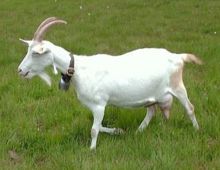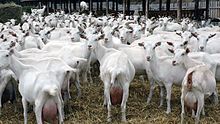 Nanny on the Engstligenalp Nanny on the Engstligenalp | |
| Conservation status | FAO (2007): no concern |
|---|---|
| Other names | |
| Country of origin | Switzerland |
| Distribution | worldwide |
| Standard | |
| Use | milk |
| Traits | |
| Weight |
|
| Height |
|
| Skin colour | white |
| Coat | white |
| Horn status | horned or hornless |
| Notes | |
| short-haired | |
| |

The Saanen is a Swiss breed of domestic goat. It takes its name from the Saanental in the Bernese Oberland, in the southern part of the Canton of Bern, in western Switzerland. It is a highly productive dairy goat and is distributed in more than eighty countries worldwide.
History
The Saanen originates in the historic region of Saanen (French: Comté de Gessenay) and in the neighbouring Simmental, both in the Bernese Oberland, in the southern part of the Canton of Bern, in western Switzerland.
It is reported from more than eighty countries. The total world population is reported to be over 900,000 head. Of these, some 14,000 are in Switzerland.
It has since the nineteenth century been exported to many countries of the world, and has given rise to many local sub-breeds, often through cross-breeding with local goats. Among these local variants are the Banat White in Romania, the British Saanen, the French Saanen, the Israeli Saanen, the Russian White, the Weiße Deutsche Edelziege [de] in Germany, and the Yugoslav Saanen.
A black variant, the Sable Saanen, was recognised as a breed in New Zealand in the 1980s.
Characteristics
The Saanen is the largest breed of Swiss goat: billies stand about 90 cm (35 in) at the withers and weigh a minimum of 85 kg (190 lb). It has white skin and a short white coat; some small pigmented areas may be tolerated. It may be horned or hornless, and tassels may be present. The profile may be straight or somewhat concave; the ears are erect and point upwards and forwards.
Use and management
The Saanen is the most productive milk goat of Switzerland, which has the most productive milking goats in the world. Average milk yield is 838 kg in a lactation of 264 days. The milk should have a minimum of 3.2% fat and 2.7% protein.
It is not well suited to extensive management, and is usually raised intensively. Being pale-skinned, it does not tolerate strong sun.
Notes
References
- Barbara Rischkowsky, D. Pilling (eds.) (2007). List of breeds documented in the Global Databank for Animal Genetic Resources, annex to The State of the World's Animal Genetic Resources for Food and Agriculture. Rome: Food and Agriculture Organization of the United Nations. ISBN 9789251057629. Accessed October 2016.
- ^ Rassenstandards (Ausgabe 01.01.2014) (in German). Fédération suisse d'élevage caprin/Schweizerischer Ziegenzuchtverband/Federazione svizzera d'allevamento caprino. Archived 3 February 2015.
- ^ Transboundary breed: Saanen. Domestic Animal Diversity Information System of the Food and Agriculture Organization of the United Nations. Accessed October 2016.
- Saanen/Switzerland. Domestic Animal Diversity Information System of the Food and Agriculture Organization of the United Nations. Accessed October 2016.
- ^ Valerie Porter, Lawrence Alderson, Stephen J.G. Hall, D. Phillip Sponenberg (2016). Mason's World Encyclopedia of Livestock Breeds and Breeding (sixth edition). Wallingford: CABI. ISBN 9781780647944.
- Lena Olausson, Catherine Sangster (2006). Oxford BBC Guide to Pronunciation: The Essential Handbook of the Spoken Word. Oxford: Oxford University Press. ISBN 9780192807106.
| Goat breeds of Switzerland | |
|---|---|